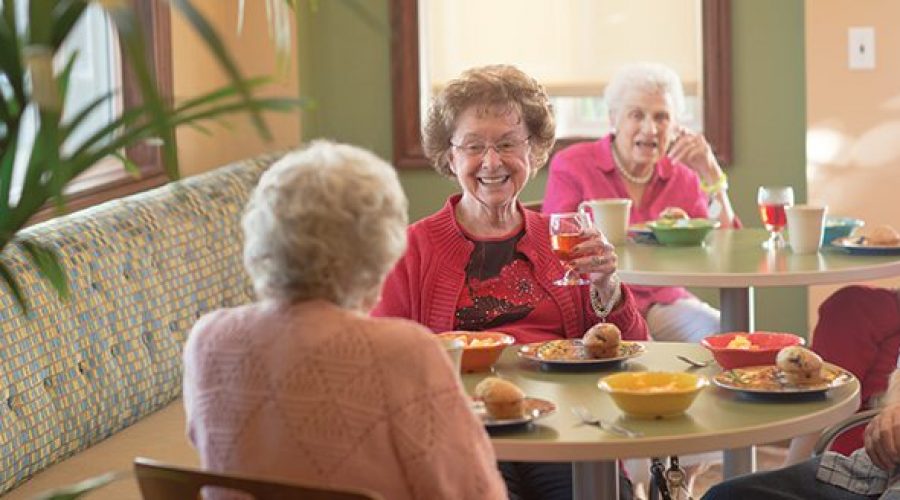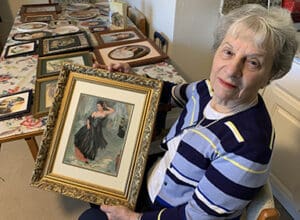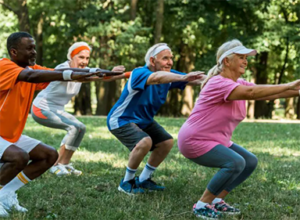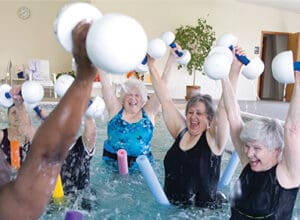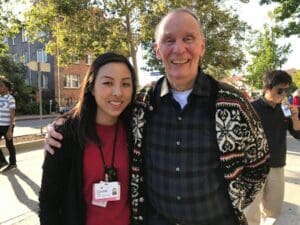
Understanding Memory Care for Seniors
As you navigate the journey of caring for an aging loved one, the challenge of supporting their cognitive well-being becomes increasingly paramount. Memory care, a specialized way of assisted living, is designed to provide a nurturing environment that tailors to the unique needs of individuals with Alzheimer’s disease, dementia or other memory-related conditions. Memory care in Cupertino, CA, aims to better the quality of life for seniors while preserving their dignity and independence.
Recognizing the impact that memory loss can have on both the individual and their family, memory care communities offer a comprehensive range of services tailored to address the multifaceted aspects of cognitive decline. From personalized care plans and structured routines to a secure and stimulating environment, these communities strive to create a supportive and enriching atmosphere that fosters a sense of familiarity and comfort.
The Impact of Music on Memory
Music holds a remarkable capacity to evoke memories, emotions and connections that often remain intact even in the face of cognitive decline. The intricate interplay between music and memory is deeply rooted in the human brain, where the processing of musical stimuli involves multiple regions, including those responsible for memory formation and retrieval.
Research has shown that familiar melodies and lyrics can trigger the retrieval of long-term memories, eliciting emotional responses and facilitating communication in individuals with memory impairments. This phenomenon, known as the “music-memory connection,” has deep implications for enhancing the quality of life and overall well-being of seniors in memory care.
Furthermore, music has the ability to overcome language barriers and cultural differences, creating a universal language that resonates with individuals from diverse backgrounds. This universal appeal makes music an invaluable tool in memory care settings, where residents may come from various cultural and linguistic backgrounds.
How Music Therapy Enhances Memory Care
Music therapy, a specialized field that utilizes music as a therapeutic intervention, has emerged as a powerful approach in memory care settings. Certified music therapists work closely with residents, tailoring music-based activities and interventions to address their individual needs and preferences.
One of the key benefits of music therapy in memory care is its ability to stimulate cognitive function and promote emotional well-being. Through carefully curated playlists, sing-alongs and interactive music-making sessions, residents are encouraged to engage their minds, recall memories and express themselves through the universal language of music.
This type of therapy can also play a significant role in managing challenging behaviors often associated with memory impairments. By incorporating familiar and soothing melodies, music therapists can create a calming environment, reducing agitation and promoting relaxation. This non-pharmacological approach not only betters the quality of life for seniors but also creates a more positive and harmonious atmosphere within the care community.
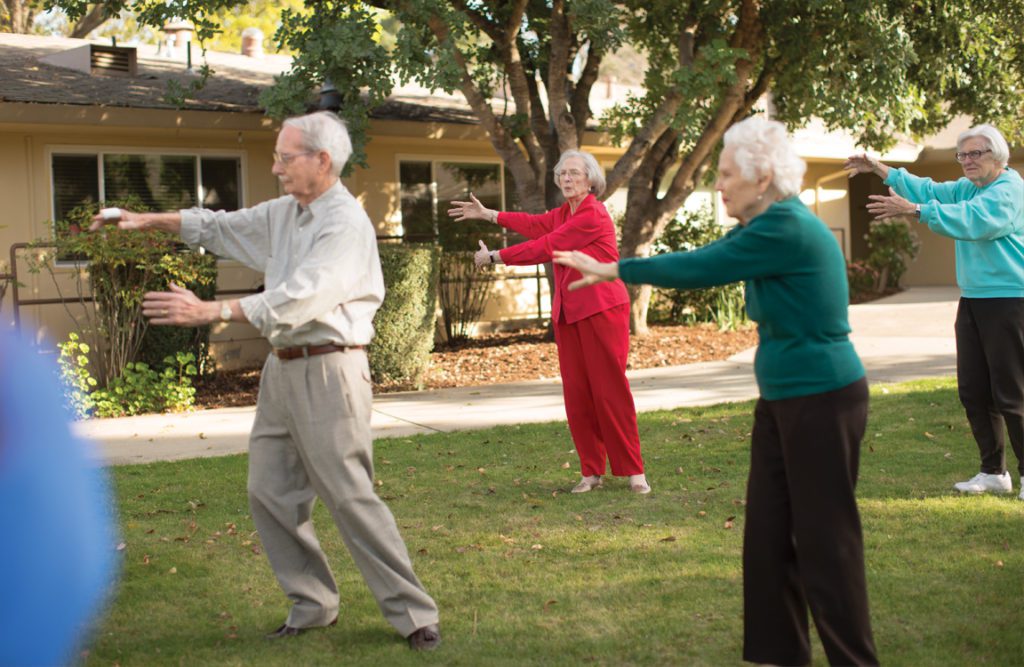
The Role of Music in Memory Care Programs
- Music and Movement: Combining music with physical activity, such as dancing or simple exercises, can enhance cognitive stimulation, improve motor skills and promote socialization among residents. These interactive sessions not only provide physical benefits but also create opportunities for self-expression and joy.
- Reminiscence Therapy: By incorporating familiar songs and melodies from residents’ past, reminiscence therapy encourages the recall of cherished memories and life experiences. This approach can foster a sense of validation and emotional well-being, particularly for those with advanced memory impairments.
- Music-Based Sensory Stimulation: Engaging multiple senses through music, aromatherapy and tactile experiences can create a calming and enriching environment for residents. This holistic approach aims to promote relaxation, reduce anxiety and enhance overall well-being.
- Intergenerational Music Programs: Collaborating with local schools, community organizations or music groups, memory care communities can facilitate intergenerational music programs. These interactive sessions not only provide cognitive and social stimulation for residents but also foster meaningful connections across generations.
Incorporating Music into Daily Routines for Seniors
- Personalized Playlists: Curating personalized playlists that feature residents’ favorite songs, genres or artists can evoke positive emotions, promote relaxation and provide familiarity in their living spaces.
- Background Music: Carefully selected background music can create a soothing ambiance in common areas, dining rooms and activity spaces, promoting a calming and enjoyable atmosphere for residents.
- Live Music Performances: Inviting local musicians or community groups to perform live music can create a vibrant and engaging atmosphere, fostering social connections and encouraging residents to participate through singing, clapping or simply enjoying the melodies.
- Music-Themed Activities: Incorporating music into various activities, such as sing-alongs, instrument playing or music trivia games, can provide cognitive stimulation, social engagement and opportunities for self-expression.
Benefits of Music-based Activities in Memory Care
The integration of music-based activities and therapies in memory care settings offers a multitude of benefits for residents, caregivers and the overall care community. Here are some of the most notable advantages:
- Cognitive Stimulation: Music has the ability to engage multiple regions of the brain, promoting cognitive stimulation and potentially slowing the progression of memory-related conditions.
- Emotional Well-being: Familiar melodies and lyrics can evoke positive emotions, reduce anxiety and agitation and provide a sense of comfort and familiarity for residents.
- Social Connections: Music-based activities often foster social interactions, encouraging residents to engage with one another, share memories and build meaningful connections.
- Self-Expression: Through singing, dancing or playing instruments, residents can find avenues for self-expression, creativity and personal fulfillment, enhancing their overall quality of life.
- Caregiver Support: Music-based interventions can also benefit caregivers by providing them with non-pharmacological tools to manage challenging behaviors, promote relaxation and create positive interactions with residents.
- Intergenerational Connections: Intergenerational music programs can bridge the gap between generations, fostering understanding, respect and meaningful connections between residents and younger participants.
The Power of Music in Enhancing Memory Care for Seniors
As you navigate the journey of caring for a loved one with memory-related conditions, embracing the power of music can significantly enhance their overall well-being and quality of life. In Cupertino, CA, memory care communities that prioritize the integration of music-based activities and therapies are at the forefront of providing compassionate and holistic care for seniors.
Sunny View in Cupertino, CA, offers a comprehensive range of senior living options. Our dedicated team is committed to providing personalized care and support, ensuring your loved one’s needs are met at every stage of their journey. Contact us today at (408) 454-5600 to schedule a tour and learn more about how we can create a fulfilling and enriching lifestyle for your loved one.
